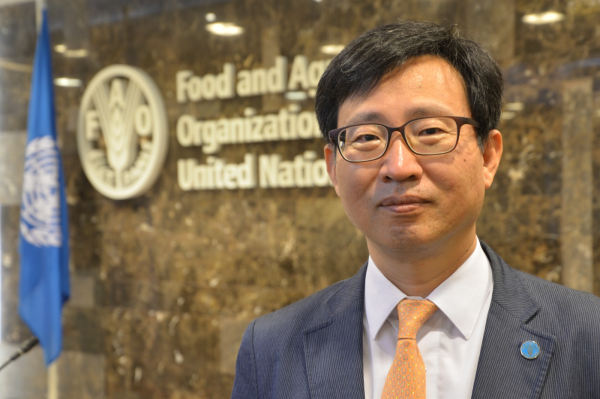ຂປລ
(KPL) Each year, the United Nations and its Specialized Agencies mark many days on our calendars for special observations. This month, October, has more than usual – in fact, seven days in total. But what I find special about the days in October is the common thread each day has with the others.

By Jong-Jin Kim, Assistant Director-General and FAO Regional Representative for Asia and the Pacific
(KPL) Each year, the United Nations and its Specialized Agencies mark many days on our calendars for special observations. This month, October, has more than usual – in fact, seven days in total. But what I find special about the days in October is the common thread each day has with the others.
There is of course World Food Day on 16 October, that my agency, the Food and Agriculture Organization of the United Nations (FAO), promotes. Ending hunger in all its forms is a key objective of the SDGs. A day earlier is International Day of Rural Women, while the following day, 17 October, is International Day for the Eradication of Poverty. These three days, all back-to-back, resonate with a common message: poverty leads to hunger, and rural women are often the most vulnerable and disadvantaged.
If the world would better recognize the value of rural women in agriculture – and compensate them for their work, give them a greater say and access to finance – the world, and our Asia-Pacific region in particular – would accelerate in our collective goal to eradicate poverty and end hunger and malnutrition. Most of the world’s hunger, most of its rural women, and much of the poverty is found here, in our region – a region that has been backsliding for several years in the fight against hunger.
These special days are not just announced and observed to get a quick headline, only to be forgotten the day after, they are fixtures meant to remind us of our duty to our fellow women and men that we must take more action – proactively to meet the 2030 SDG deadlines. It’s not enough to circulate and pin up a few posters or 30 second TV adverts or send out a short message on our social media that many will quickly scroll past without registering the importance. All of these special days have meaning and a call to action.
I mentioned there are seven days in October recognized by the United Nations Common System. The other four also carry resonance with the three above. They are World Habitat Day (7 October), International Day for Disaster Reduction (13 October), World Statistics Day (20 October) – and finally United Nations Day itself on 24 October each year.
While observance of each of these special days is led by a corresponding UN Agency, they are tied, in one way or another, to reducing poverty, hunger and inequalities (SDGs 1,2,10). After all, everyone needs to have a roof over their head. Climate change and climate-related disasters set back the fights against hunger and poverty, and without better statistics in all sectors, how can we ever know if we are making progress for humankind or even to understand if the situation is getting worse?
So, we all need to pay attention to these special days. They are not just random dates on our calendars. And we need to do more than just observe them. Every Member Nation, every UN agency, every NGO, every CEO, every man, woman and the world’s youth must work together to make the world a better place.
At FAO, we have taken the word ‘better’ to a higher level. We have repositioned ourselves and our work to achieve and deliver Better Production, Better Nutrition, a Better Environment, and a Better Life for all, leaving no one behind. Working with our Member Nations, we are empowering rural women, we are striving to ensure smallholders in all food production get a better deal, we have been introducing climate-smart agricultural practices to our Members, and working to ensure everyone has access and the means to achieve a healthy diet to thrive and survive.
Let’s view these special days in October, not as seven individual days, but as days with a common message. As a regional and global community, let them inspire us to work with a single vision of making the world a better place for us all.
The world may be our responsibility today. But it will soon be the responsibility of a new generation, and then a newer generation after that. Collectively, we have a duty of care now and in the future to honour Mother Earth for our sake, for the sake of our children and their children. Let these special days be a reminder to us all, that no one should go hungry, no one should live in poverty, no one should be homeless, and to achieve this we must end inequalities for everyone, of all genders, and forever.
KPL